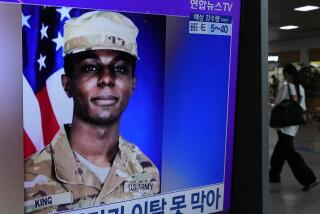Snowden leaves Hong Kong; final destination unclear

- Share via
BEIJING -- Hong Kong authorities allowed wanted former U.S. National Security Agency contractor Edward Snowden to fly out of the city on Sunday after finding that documents supplied by Washington seeking his arrest did not “fully comply with the legal requirements under Hong Kong law.”
Snowden was en route to a “third country,” officials in the Chinese territory said. The South China Morning Post, a Hong Kong newspaper that had repeated contact with the American during his month-long stay in the city, reported that Snowden left on a flight bound for Moscow.
Russia’s ITAR-Tass news agency, citing an unidentified Aeroflot airlines official, said Snowden would fly from Moscow to Cuba on Monday and then on to Venezuela. Last week, Iceland had also been mentioned as a possible destination for Snowden.
Exactly how Snowden’s departure was arranged was unclear, but WikiLeaks founder Julian Assange has praised him as a “hero,” and according to the organization’s Twitter feed, Snowden was accompanied on the flight to Russia by WikiLeaks legal advisors.
“WikiLeaks has assisted Mr. Snowden’s political asylum in a democratic country, travel papers and safe exit from Hong Kong,” the group said.
U.S. authorities are seeking to prosecute Snowden for disclosing to the media a trove of documents detailing secret American surveillance programs. On Friday, U.S. authorities revealed that Snowden had been charged with theft of government property and two violations of the Espionage Act: unauthorized communication of national defense information and providing U.S. classified intelligence to an unauthorized person.
Hong Kong officials said Sunday that U.S. authorities had asked Hong Kong to issue a provisional arrest warrant for Snowden but that without “sufficient information to process the request for provisional warrant of arrest, there is no legal basis to restrict Mr. Snowden from leaving Hong Kong.”
Hong Kong authorities said they had informed the U.S. government of Snowden’s departure and said they would continue to seek details from Washington about Snowden’s revelations that U.S. hacking activities had targeted facilities in Hong Kong.
Snowden’s departure from Hong Kong offered authorities in both the semi-autonomous Chinese territory and Beijing a face-saving if inelegant solution to a complicated situation that threatened to strain relations for years had Snowden exercised his various rights to appeal or applied for asylum.
Hong Kong, a former British territory, has a treaty with the U.S. that allows for extraditions; however, mainland officials are allowed to intervene in cases that they determine concern foreign policy or national defense.
Willy Lam, a political analyst at the Chinese University of Hong Kong, said it was “highly likely” that Beijing authorities had instructed Hong Kong officials not to surrender Snowden.
“The decision was basically made in Beijing not to send him to the U.S.,” Lam said. “Hong Kong was seeking a politically expedient way out before the legal procedures started. What the Hong Kong government said is that they received Washington’s request but were seeking more info. But they haven’t gotten it. So the pretext was that they have no legal reason to detain him.”
“This is a sort of a clever way out for the Hong Kong government to avoid getting into a more difficult situation,” Lam added.
Simon N.M. Young, a law professor at the University of Hong Kong who has been closely monitoring Snowden’s case, called Hong Kong’s decision to allow the departure “a shocker.”
“I thought he was going to stay and fight it out,” Young said. “The U.S. government will be irate with their Hong Kong counterparts. They may even question whether the Hong Kong government was acting in good faith pursuant to their treaty obligations.”
Opposition to extraditing Snowden from Hong Kong had been building both in the city and on the mainland over the last several weeks. A public opinion poll last weekend in the city of 7 million found about half of respondents did not favor sending him back to the United States for prosecution.
An editorial last week in the Global Times, a Beijing newspaper with close ties to the Communist Party, inveighed against extraditing Snowden, saying “it would be a face-losing outcome for both the Hong Kong government and the Chinese central government if Snowden is extradited back to the U.S. Unlike a common criminal, Snowden did not hurt anybody. His ‘crime’ is that he blew the whistle on the U.S. government’s violation of civil rights.”
“His whistle-blowing is in the global public interest,” the commentary added. “Therefore, extraditing Snowden back to the U.S. would not only be a betrayal of Snowden’s trust, but a disappointment for expectations around the world. The image of Hong Kong would be forever tarnished.”
In Hong Kong, support for Snowden hinged both on Hong Kong’s historic status as a refuge for dissidents -- mostly from the mainland -- as well as locals’ outrage over Snowden’s revelations that their supposed ally, the United States, had been targeting the city for extensive surveillance activities.
Hundreds of Hong Kongers marched last Saturday on the U.S. consulate in the city, chanting slogans such as “Protect Edward Snowden!” and carrying posters of President Obama saying, “Big Brother is Watching You.”
Law Yuk Kai, director of the Hong Kong Human Rights Monitor, said Sunday that he was pleased that the city government had “honored its obligation under our legal system to allow Mr. Snowden to leave” the city.
“Hong Kong was probably not a very good place for him,” Law said. “The legal procedures involved had certain uncertainties: First, the legal system is not totally in our hands; Beijing has a lot to say. Second, the procedure relates to a large number of big legal issues … extradition legislation, refugee laws and constitutional obligations to protect rights under the International Covenant on Civil and Political Rights.”
Tom Grundy, one of the organizers of last weekend’s demonstration in support of Snowden, said he was “surprised and relieved” that the Hong Kong government “had the option to detain him and put out an arrest warrant and they didn’t.”
“It’s probably good for him,” Grundy said. “It could have been a bit messy. Had he claimed asylum … he would have found himself in a very much broken local immigration system. It could have been a long drawn out process. … We’re relieved for him, and we hope his final destination country will provide him some asylum.”
Young agreed that Snowden’s situation would have “changed drastically” with the issue of an arrest warrant in Hong Kong.
“From his ‘safe place’ he would have been detained in prison awaiting the completion of both his surrender and asylum proceedings,” Young said. “That would have been a harsh existence if he was to fight it out and no certainty that he would not be surrendered.”
Lam said the decision to allow Snowden to leave Hong Kong would certainly result in a “period of tension” both between the U.S. and Beijing and the U.S. and Hong Kong.
“The U.S. of course will now say that Hong Kong’s position as an autonomous region might be jeopardized, because it is quite clear that Hong Kong has taken orders from Beijing not to extradite Snowden. I think it’s likely U.S. will start asking questions about status of Hong Kong, whether it is really still that autonomous.”
More to Read
Sign up for Essential California
The most important California stories and recommendations in your inbox every morning.
You may occasionally receive promotional content from the Los Angeles Times.














